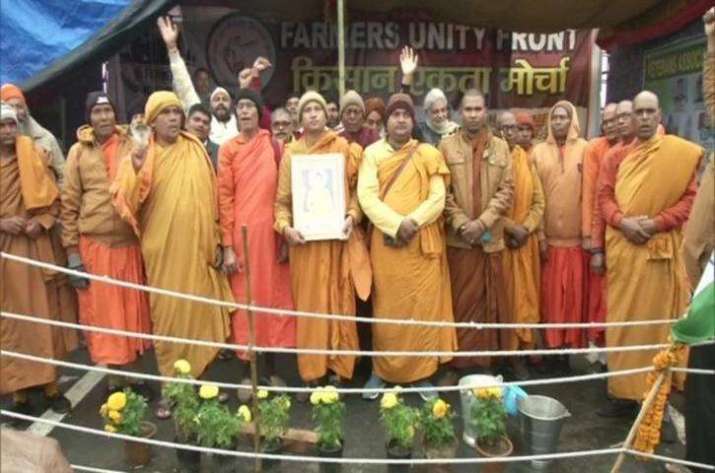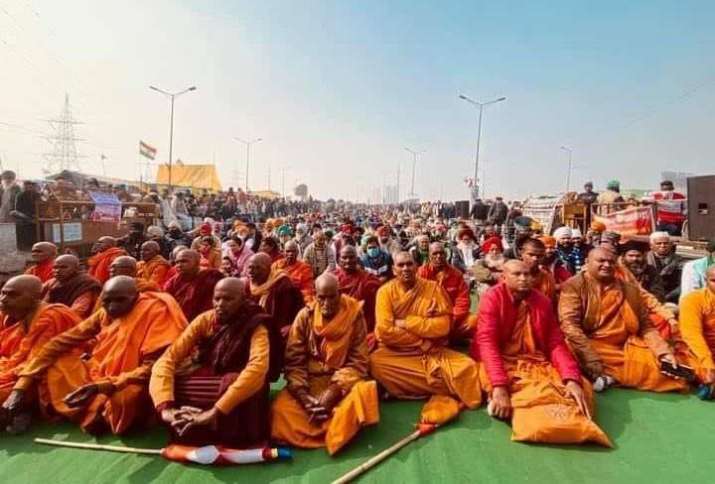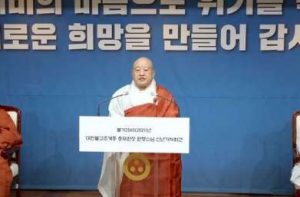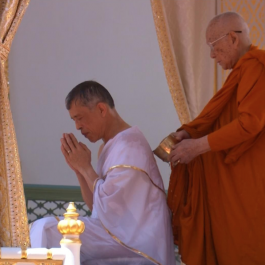
Buddhist monks have bolstered the ranks of tens of thousands of Indian farmers who are locked in a defiant standoff with India’s government on the outskirts of Delhi after months of strikes, protests, and demonstrations against controversial new agricultural reform legislation, which the farmers say threatens their livelihoods. Meanwhile, the arrest on Saturday of 22-year-old climate activist Disha Ravi over a shared “toolkit” document to help the farmers in their protest has sparked widespread condemnation, with many calling it an attack on free speech and on democracy.
Farmers in India have been rallying for months, in one of the largest protests yet seen against the government of Prime Minister Narendra Modi, over three laws enacted in September last year that deregulate the sale of crops. The government has insisted that the new legislation will give farmers more freedom, but farmers have expressed concern that the laws will place private buyers in a stronger position in a marketplace that has traditionally been heavily subsidized by the government. The farmers say the legal reforms that have long protected small landholders’ in the market will drive down prices for their produce, leaving no safeguards to protect them against takeovers and exploitation by large corporations.

While a number of monks, many of whom have strong roots in India’s agricultural communities, joined the protestors early in December, before the government crackdowns on the protests escalated into violence, more have reportedly arrived following the culmination of Losar, the new year in the lunisolar Tibetan calendar. Many of the monks are gathered in a dedicated camp set up on the border between Delhi and Uttar Pradesh, vowing not to leave until the farming laws have been repealed.
“We have left our temples in Lucknow to join the farmers in their protest against the three laws,” one monk was quoted as saying. We have taken an oath not to leave till the farmers get what they are fighting for—the repeal of the three black laws.” (ANI)
The protests first began in August, in the states of Punjab and Haryana. In November, after the government had pushed the new legislation through, farmers marched on New Delhi, where they were met by a heavy-handed police response. This all occurred at the height of the COVID-19 pandemic in a country that has to date reported almost 11 million cases and 155,813 deaths.*
According to the government, the new legislation is needed to improve the efficiency of India’s sprawling agricultural sector, which represents the livelihoods of some 60 per cent of India’s 1.3 billion people, but only 16 per cent of GDP. And while some economists agree that the sector is in need of reform, many have criticized the government’s heavy-handed unilateral action in imposing the new legislation with almost no independent consultation.
Although a large number of the protesting farmers belong to India’s Sikh minority in the states of Punjab and Haryana, the monks say that the protests are centered on the livelihoods of all Indian farmers, irrespective of caste, social, or ethnic allegiance, and that religious groups and independent supporters can “galvanize collective public action for the common good.” And while Buddhism teaches non-violence, they say, it does not teach non-resistance: “[Buddhism] has taught us not to be mute spectators to social injustices,” said an elderly monastic. “Farming has no religion, and we are only agitating for the right to life and livelihood.” (India Times)
Meanwhile, politicians, activists, and high-profile public figures across India have criticized the arrest under the colonial-era sedition law on 13 February of 22-year-old Disha Ravi for helping to edit an online document promoted by Swedish climate activist Greta Thunberg in support of the farmers. Indian police have described Ravi as a “key conspirator” in the “formulation and dissemination” of the protest “toolkit.” (BBC News)

“The main aim of the ‘toolkit’ was to create misinformation and disaffection against the lawfully enacted government,” Delhi police official Prem Nath told reporters. “The toolkit sought to artificially amplify fake news through various tweets which they have created in the form of a tweet bank. And they sought the public to participate in the action on 26 January that was the Republic Day of India,” (Reuters)
Arrest of 21 yr old Disha Ravi is an unprecedented attack on Democracy. Supporting our farmers is not a crime.
— Arvind Kejriwal (@ArvindKejriwal) February 15, 2021
I still #StandWithFarmers and support their peaceful protest.
— Greta Thunberg (@GretaThunberg) February 4, 2021
No amount of hate, threats or violations of human rights will ever change that. #FarmersProtest
The unsigned document, which is publicly available on an encrypted sharing site, lists ways in which supporters can help the ongoing protests.
“I did not make the toolkit. We wanted to support the farmers. I edited two lines on 3 February,” Ravi told a Delhi court hearing on Sunday. (BBC News) The court ordered that Ravi remain in police custody for five days.
Questions have been raised over the fact that Ravi did not have legal representation during the hearing. Ravi’s arrest is “an unprecedented attack on democracy,” Delhi chief minister Arvind Kejriwal tweeted on Monday. “Supporting our farmers is not a crime.” (Twitter)
In Ravi’s hometown of Bengaluru, crowds of people bearing placards gathered to call for her release, with activists planning more protests across India. On social media, the hashtag #IndiabeingSilenced has been trending.
“This is their way of trying to scare away youngsters from raising their voice about anything,” said Leo Saldanha, a member of the Environment Support Group in Bengaluru. “This sends a message to all young people out there that, you know, shut up and stay at home or this is what is going to happen to you.” (Reuters)
* Johns Hopkins Coronavirus Resource Center
See more
Farmers Protest: ‘Faith tells us not to be passive viewers of social inequality, says Buddhist Monk (Krishi Jagran)
Buddhist Monks Join Farmers, Deliver A Powerful Message (Outlook)
Buddhist Monks Join Farmers In Their Agitation, Deliver A Powerful Message (India Times)
Farmers’ protest enters 39th day, Buddhist monks lend support (ANI)
January 4: Buddhist Monks Take Part in the Protest and Rain Damages Make Shift Farmer Tents (sikh24.com)
India’s arrest of activist tied to Greta Thunberg’s movement sparks outrage (Reuters)
Disha Ravi: India activist arrest decried as ‘attack on democracy’ (BBC News)
Climate Activist Jailed in India as Government Clamps Down on Dissent (The New York Times)












